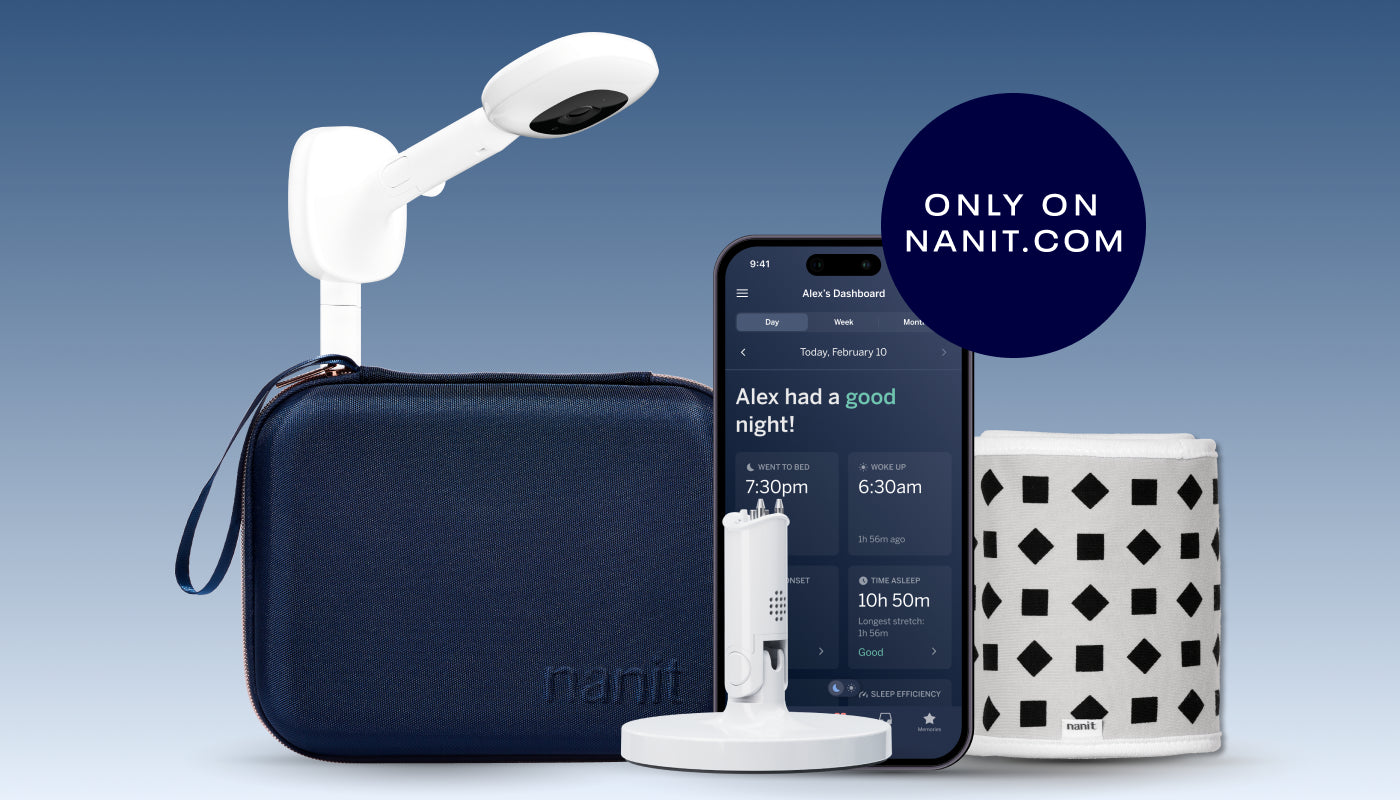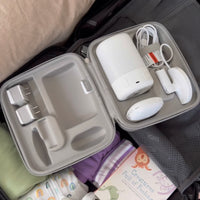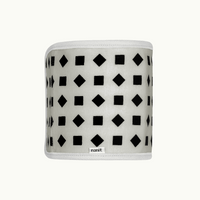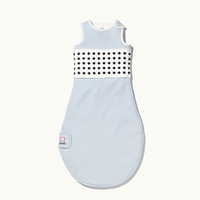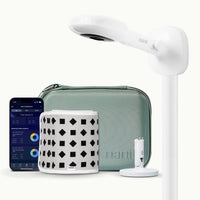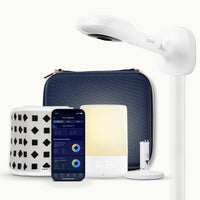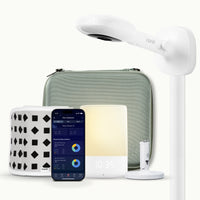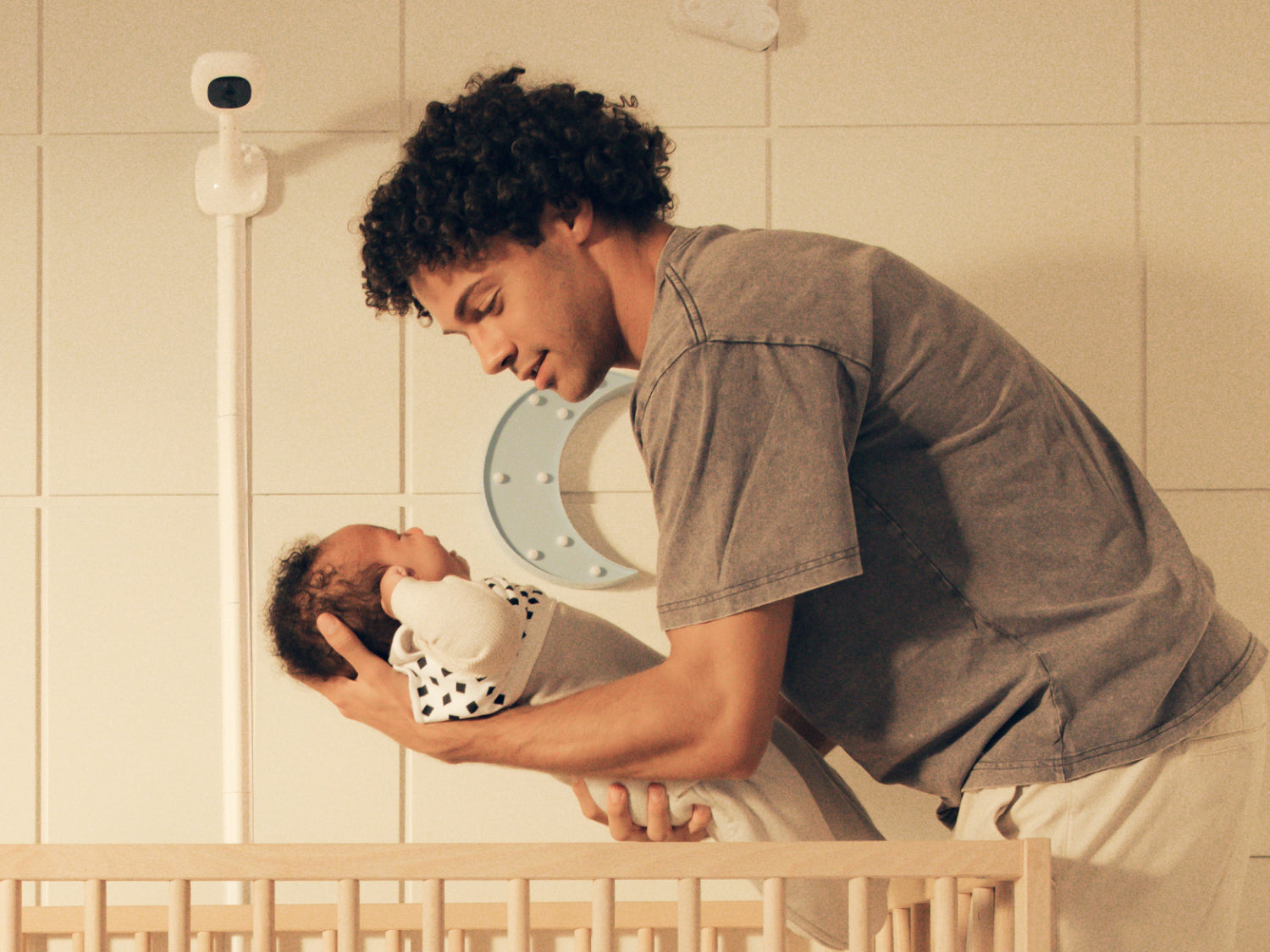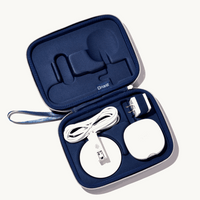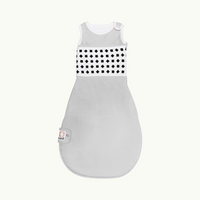12 weeks! This isn’t just another week in your pregnancy journey — it’s a major milestone that marks the end of your first trimester. If you've been holding your breath through those early weeks, you can finally start to exhale. This is when pregnancy starts to feel less like surviving and more like thriving.
At 12 weeks, you're getting ready to enter what many call the "golden period" of pregnancy. Your baby's development has hit some incredible milestones, many of those rough pregnancy symptoms are starting to ease up, and you might actually feel human again. Let's dive into what's happening right now and what you can look forward to.
💡 Nanit Expert Insight
“The first trimester often makes sleep challenging due to rising hormones, morning sickness, and frequent bathroom trips, leading to unusual daytime tiredness. By the second trimester, symptoms often ease, hormones stabilize, and many women feel more rested and comfortable” - Maristella Lucchini, PhD., Senior Clinical Researcher at Nanit
Your Baby's Development at 12 Weeks Pregnant
Right now, your little one is about the size of a lime—roughly 2.1 inches from crown to rump and weighing about 0.49 ounces. But what's really incredible is that all of your baby's major organs are now formed and functioning. This marks the official transition from the embryonic period to the fetal period, meaning all major organ systems are now formed and will continue maturing throughout the rest of your pregnancy.
Key Development Milestones at 12 Weeks Pregnant:
-
Complete organ formation: All major organs and body systems are now developed, which significantly reduces the risk of birth defects
-
Nervous system maturation: Brain and spinal cord continue rapid development
-
Facial refinement: Eyes move closer together, ears reach their final position
-
Limb coordination: Your baby can make fists and wiggle toes
-
Digestive system: Intestines begin practicing contractions
-
Kidney function: Baby begins producing urine
-
Bone development: More cartilage transforms into bone tissue
-
Nail formation: Fingernails and toenails begin to appear
-
Also — Their heart is beating strong at 120-160 beats per minute, and their tiny muscles are growing stronger.
Changing Pregnancy Symptoms at 12 Weeks Pregnant
Here’s something to look forward to — those pregnancy symptoms that may have been making life challenging are likely to start turning a corner. As your hormones begin to level out (finally!), many pregnant people find that the worst of first trimester discomfort starts to fade.
Improving Symptoms at 12 Weeks Pregnant:
-
Morning sickness often decreases significantly
-
Fatigue starts to improve, with energy levels returning
-
Mood swings become less frequent and intense
-
Food aversions may start to fade
-
Overall sense of well-being often improves
Continuing or New Symptoms at 12 Weeks Pregnant:
-
Breast changes continue as your body prepares for breastfeeding
-
Frequent urination may persist
-
Mild cramping as your uterus continues to expand
-
Skin changes, including the pregnancy glow and darkening of certain areas
-
Nasal congestion due to increased blood flow
-
Heartburn may begin to appear as your uterus grows
Getting a Good Night’s Sleep at 12 Weeks Pregnant
Around 12 weeks, you may find that your sleep begins to feel a bit easier. While you might not necessarily sleep more than you did in the first trimester—a time when hormonal changes often cause profound fatigue—the quality of your sleep often improves. As morning sickness typically starts to subside, the nighttime nausea that may have fragmented your sleep in the early weeks should significantly decrease. As you approach the second trimester, your baby bump is usually still relatively small, which often allows for more comfortable sleeping positions and can help to reduce back pain compared to later in pregnancy.
Better Sleep at 12 Weeks Pregnant:
Take advantage of this improvement in sleep quality by establishing healthy sleep habits that will serve you throughout pregnancy. Consider investing in a pregnancy pillow, maintain a consistent bedtime routine, and create a comfortable sleep environment that will support quality rest as your pregnancy progresses.
Prenatal Screening & Care at 12 Weeks Pregnant
Your prenatal care at 12 weeks pregnant includes several important screening options. This timing is crucial for first trimester screening, which combines blood tests with ultrasound measurements to assess your baby's risk for certain genetic conditions. The nuchal translucency screening, performed between 11-14 weeks, measures the fluid at the back of your baby's neck to help assess risk for Down Syndrome and other chromosomal abnormalities.
Important Prenatal Screening Options at 12 Weeks Pregnant:
|
Screening Test |
Timing |
What It Measures |
What to Expect |
|
Nuchal Translucency |
11-14 weeks |
Fluid accumulation behind baby's neck |
Ultrasound measurement combined with blood work |
|
First Trimester Screen |
10-13 weeks |
Risk for chromosomal abnormalities |
Blood test measuring pregnancy hormones |
|
Cell-Free DNA Testing |
10+ weeks |
Fetal DNA in maternal blood |
Simple blood test, highly accurate |
|
Routine Prenatal Labs |
Throughout pregnancy |
Maternal health markers |
Blood work to monitor your health |
All prenatal screening tests are optional, and the decision to have them is yours. Your healthcare provider will discuss these screening options with you during your prenatal appointments — these tests provide risk assessment information, not definitive answers, and they’ll help you understand what’s right for your situation.
Why 12 Weeks Pregnant Feels Like Such a Big Deal
There’s a reason many people choose to share their pregnancy news after reaching 12 weeks. The risk of miscarriage drops dramatically — from about 25% in early pregnancy to less than 1% after 12 weeks with a normal heartbeat detected. That’s more than a statistic; it’s peace of mind.
What Makes 12 Weeks a Significant Milestone:
-
Significantly reduced miscarriage risk (less than 1% with normal heartbeat)
-
Major organ development complete, reducing birth defect risk
-
Pregnancy symptoms often improve, making daily life more manageable
-
Energy levels typically return, allowing for better quality of life
-
It’s a common time to share pregnancy news with family & friends
-
Prenatal appointments typically switch to monthly
Deciding When to Share Your Pregnancy News
Many parents choose to announce their pregnancy around 12 weeks, but the timing is completely personal. Some factors to consider include your comfort level, work situation, family dynamics, and personal preferences. There’s no right or wrong way to do this!
Things to consider:
-
Family sharing: Decide the order and method for telling family members
-
Social media: Consider your comfort level with public announcements
-
Close friends: Think about who you want to tell personally first
-
Work announcements: Plan how and when to tell your employer and colleagues
-
Timing considerations: Factor in holidays, special events, or family gatherings
Transitioning to the Second Trimester
You're about to enter the second trimester (weeks 13-27), and there's good reason it's called the "golden period." This is typically when you'll feel most like yourself, have the most energy, and really start to enjoy being pregnant.
What to Expect in the Coming Weeks:
-
Energy improvement: Most people feel significantly more energetic
-
Morning sickness typically resolves completely
-
You may start feeling your baby move (18-25 weeks)
-
Anatomy ultrasound around 18-20 weeks
-
Baby's sex can usually be determined via ultrasound
-
Prenatal appointments typically occur monthly
-
Your belly will become more noticeable
Nutrition & Lifestyle at 12 Weeks Pregnant
With your appetite returning and food aversions fading, this is a great time to focus on nutrition. You don't need to be perfect, but getting good nutrients now will support your baby's continued development and help you feel your best.
Nutritional priorities:
-
Continued prenatal vitamins: With folic acid, iron, and calcium
-
Protein intake: Aim for 75-100 grams daily for continued fetal development
-
Calcium-rich foods: Support bone development (1,000-1,300 mg daily)
-
Iron-rich foods: Prevent anemia as blood volume increases
-
Omega-3 fatty acids: Support brain and eye development
-
Hydration: Continue drinking plenty of water
-
Fiber intake: Helps prevent constipation as pregnancy progresses
Staying Active at 12 Weeks Pregnant
As their energy levels start to improve, many pregnant people find they can return to or establish a regular exercise routine. Physical activity during pregnancy can help improve sleep, boost mood, reduce pregnancy discomforts, and prepare your body for labor and delivery.
Safe Exercise Guidelines for 12 Weeks Pregnant:
Take advantage of your improved energy to establish a consistent exercise routine that you can maintain throughout your second trimester. Focus on activities like walking, swimming, prenatal yoga, or low-impact aerobics. Always consult with your healthcare provider before starting any new exercise program.
Preparing for Better Sleep in the Second Trimester
This is an ideal time to establish habits and create an environment that will support quality rest throughout your second trimester. While sleep may not be elusive during this phase, your growing belly will eventually require some adjustments to your sleep routine.
Tips for Improving Your Sleep Environment:
-
Pregnancy pillow: Invest in a quality pregnancy pillow for growing belly support
-
Room temperature: Keep your bedroom cool and comfortable
-
Sleep position: Begin practicing side sleeping, particularly left side
-
Bedtime routine: Establish consistent pre-sleep rituals
-
Sleep schedule: Maintain regular sleep and wake times
Preparing for Your Growing Family
At 12 weeks pregnant, many people start to think more concretely about preparing for their baby's arrival. You’ve got energy, you’re feeling more confident, and there’s something satisfying about starting to plan — from researching nursery items to considering childcare options and planning for parental leave.
Where to Start:
-
Nursery planning: Start thinking about themes, colors, and essential items
-
Baby registry: Begin researching registries and items you'll need
-
Childbirth education: Look into classes that start in the second trimester
-
Pediatrician research: Begin interviewing potential pediatricians
-
Sleep preparation: Research baby sleep monitoring and support tools
Creating Your Baby's Environment
You don't need a fully furnished and decorated nursery yet, but it's a great time to start thinking about creating a safe, comfortable environment for your baby. Consider the essentials you'll need and start researching products that will support your baby's development and your peace of mind as a new parent.
Peace of Mind, Delivered in HD
As you prepare for your baby's arrival, consider the Nanit Pro Smart Baby Monitor for tracking your baby's sleep patterns, breathing, and development—giving you peace of mind during those precious early months.
Building Your Baby Registry
Many pregnant people start thinking about their baby registry. If you need some inspo, our comprehensive nursery checklist for newborns can help you understand the essentials you'll need and make informed decisions about products that'll actually be useful.
Focus on quality over quantity, and remember that many items can also be purchased closer to your due date. Prioritize safety essentials, feeding supplies, and items that will help you monitor and care for your baby during those important early months.
Sweet Dreams for the Whole Family
Start thinking about your baby's sleep environment with the Nanit Sound + Light Machine. This smart device helps establish healthy sleep habits from birth with soothing sounds and gentle lighting that can be controlled through your smartphone.
When to Contact Your Healthcare Provider
While 12 weeks pregnant typically brings relief, it's important to maintain regular prenatal care and know when to contact your healthcare provider. The transition to the second trimester is generally smooth, but any concerning symptoms should always be addressed immediately
Contact Your Provider for:
-
Heavy bleeding or bright red spotting
-
Severe abdominal pain or cramping
-
Sudden onset of severe morning sickness after improvement
-
High fever (over 100.4°F/38°C)
-
Severe headaches or vision changes
-
Signs of infection
-
Sudden return of severe pregnancy symptoms after improvement
-
Concerns about fetal development or movement
Building Your Support Network
As you potentially start sharing your news, this is the perfect time to strengthen your support network. The second trimester is ideal for building relationships with other expectant parents, exploring parenting resources, and connecting with family and friends who can provide support throughout your pregnancy and into parenthood.
The Takeaway
Twelve weeks pregnant is genuinely worth celebrating — you've made it through what many consider the toughest part of pregnancy. Your baby has hit some incredible milestones with all their major organs formed and functioning, and you're probably starting to feel like a human being again instead of an exhausted, nauseous zombie. The dramatic drop in miscarriage risk (from 25% to less than 1%) isn't just a statistic—it's real peace of mind that lets you finally exhale and start getting excited about this whole journey. If you're feeling ready to share your news or start making concrete plans, that makes total sense.
Remember that every pregnancy is different, so don't stress if your experience doesn't match what your friends’ or what you read online. Some people feel amazing at 12 weeks, others need a few more weeks to hit their stride — both are completely normal. Focus on the basics: keep up with your prenatal care, eat well when you can, get as much rest as possible, and trust your body.
You're entering the "golden period" of pregnancy, and after everything you've been through to get here, you deserve to enjoy it.


